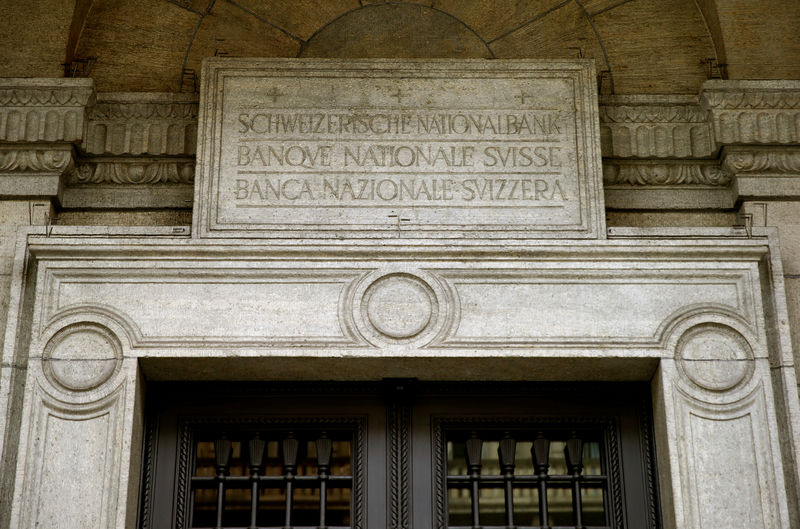By John Revill
ZURICH (Reuters) - Five years after Switzerland's central bank upended global currency markets by scrapping the Swiss franc's peg to the euro, it is under widening pressure to adjust its ultra-loose monetary policy.
The franc surged 40% against the common currency after the Swiss National Bank abandoned its 1.20 per euro cap on Jan. 15, 2015, before settling 21% higher on the day.
The SNB has since used market interventions and the world's most deeply negative interest rates to keep a lid on the safe-haven currency, whose strength hurts exporters and hampers the open economy's growth.
But those policies now face opposition from an unusual alliance of left- and right-wing politicians, as well as growing criticism from the powerful financial sector. The SNB could even see a referendum called on what it does with its profits.
"The costs are outweighing the benefits," said Martin Hess, chief economist at the Swiss Bankers Association (SBA). "That doesn't mean a quick exit would be the best route, but we have to think of ways to get out sooner rather than later."
Switzerland's pension funds and insurers have seen the value of their investments shrivel as the SNB policy rate of -0.75% has pushed the return on government bonds, one of their main holdings, into negative territory.
"Negative interest rates are an expropriation of savers, but also of pension funds indirectly," said Alfred Heer, a lawmaker from the right-wing Swiss People's Party (SVP), part of the governing coalition. "It's a perversion of the system."
"PUNISHMENT INTEREST"
Commercial banks charged a negative interest rate of -0.75% to park money securely with the SNB overnight are also increasingly vocal about what the Swiss media has dubbed "punishment interest".
Credit Suisse (SIX:CSGN) estimates banks have racked up 8.6 billion Swiss francs in charges since 2015, with another 1 billion francs likely this year.
"There is increased pressure on the banks on both sides of the balance sheet. Competition is high, the margins are getting smaller," said Andreas Gerber, the head of Credit Suisse's non-listed enterprise business.
"We have to pay for any extra liquidity with the negative interest at the SNB. There's no more value in cash."
Thomas Schulz, CFO of rival UBS's Swiss business, said: "It is becoming increasingly impossible for banks to compensate for the economic consequences of negative interest rates with alternative measures."
The Swiss Insurance Association (SVV) has called on the SNB to change stance, while the SBA has warned that persistent negative rates stunt consumption, growth and investment by making people save more.
"The SNB policy ... will negatively affect the pension system and retirees. It could also contribute to destabilizing the national economy," SVV spokeswoman Sabine Alder said.
A SHARE OF THE CAKE
Concerns about depleted pensions -- mirrored in other European countries -- have led Swiss trades unions to demand the SNB use some of its profit to cover a shortfall in the public pension scheme.
The central bank made 49 billion francs in 2019 as a result of its expansive policy while a pension scheme deficit of 4.6 billion francs is forecast for 2030.
"Given the nature of these profits which are linked to negative interest rates that harm pensions, it would be logical to redistribute part of them to the public pension system," said Pierre-Yves Maillard, president of the Swiss labour union federation (SGB) and a center-left Social Democrats (SP) lawmaker.
The SVP's Heer, who is working with lawmakers from SP, has tabled a parliamentary motion to change the payout. If this fails, both the SGB and Heer are ready to put the issue to the Swiss public in a referendum.
"If we put in some of the SNB's profits this will save us having to cover the deficit with higher sales and salary taxes," said Heer. "We simply want a share of the cake the SNB has cooked."
The SNB has recently raised the threshold before negative rate charges apply to banks and is considering a limited increase in its annual payout.
The central bank declined to comment on its future policy, but major changes are not expected soon. SNB Chairman Thomas Jordan has said negative rates are essential to weaken the franc, protect the economy and avoid deflation.
Manufacturing groups like Swissmem have backed the SNB, saying industry would have suffered more without its efforts.
"The pressure is increasing on the SNB," said Adriel Jost, an economist at consultancy Wellershoff & Partners.
"Central banks should be independent, but they cannot ignore the concerns of the general public."
